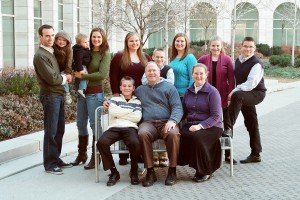A BYU professor’s study, called “American Families of Faith,” examines the correlation between relationships and religion, and identifies the links between faith and family interactions across all Abrahamic religions.

This project entailed interviewing more than 200 families across all eight regions of the United States involved with many different sects of Christianity, Judaism and Islam. It has been in the works for more than a decade, and provides the largest qualitative sample of families of faith in the country.
David Dollahite, a professor in the School of Family Life and the leader of this project, explained how other studies have been done that show a correlation between religious families and their behaviors, but no one knows exactly what aspects of religion influence these behaviors for the better.
“So my overall objective with this ‘American Families of Faith’ project is to look into the hows and whys of the connection between religion and relationships, or between families and faith,” Dollahite said. “And so I wanted to talk to people that were actually living a religious family life and ask them if they could tell us what they thought were the processes in terms of what was it about their beliefs and practices that tended to help them in their marriage and family.”
This project differs from others in the sense that it focused on the question “how are you religious?” rather than “how religious are you?” This leads to the idea that people are most successful when they obtain a generative faith that serves the purpose of lifting others as opposed to a self-oriented faith.
“One of the most interesting findings is that religion is incredibly relational,” Dollahite said. “Our research looks at the nexus of religion and relationships, so when you bring religion and relationships together, what are the best ways to do that so that people are happy with their faith and they are happy with their relationships?”
This finding, as well as many others, was consistent across the different religions studied.
“Mostly what we found is that highly religious people of whatever faith tend to be quite similar in terms of how they live their marriage and family life,” Dollahite said. “For people who are highly religious and trying to live a faith life, it doesn’t make that much difference where you live, you are going be doing the same kinds of things. You are going to be trying to live a godly life, and those things cut across religions, and those things cut across geographical locations.”
These findings have been published in peer-reviewed articles to ensure that the hypotheses are well-supported and that all the information is sound. The current plan for the project now is to go public and write a book to help families get more serious about their faith, as well as make better connections between religion and faith.
Loren Marks, professor at Louisiana State University and a partner in the “American Families of Faith” project, hopes readers can “(learn) from proven, first-hand marriage experts how they had kept their relationship with God and each other vibrant.”
The project offers students the opportunity to understand other cultures and help shape their views on diversity.
“Whether you are actively religious or not, studying others’ reasoning, beliefs and practices can be beneficial as we shape ourselves through early adulthood,” said Heather Patiño, a research assistant for the project. “To have a solid foundation on your own opinions of the world around you, you need to understand the deep diversities in others’ lives. As I learn about others beliefs and practices, I am enabled to communicate with others more respectfully and in a way that they can understand my beliefs.”
According to Dollahite, it is helpful for families trying to live a faith-oriented life to realize that there are many others across many different religions trying to do the same.
“The power of the deep, profound similarities was clear,” Dollahite said. “And I felt a kinship with the families I interviewed because they were on the same journey that I was on, and that fellow Latter-day Saints are on — that is, trying to live a faith-oriented family life in a culture that is increasingly individualistic and secular.”




